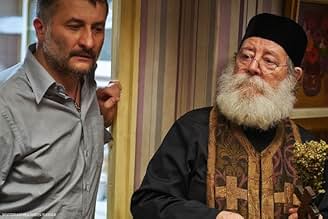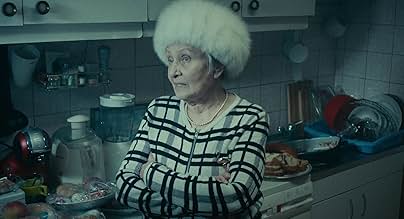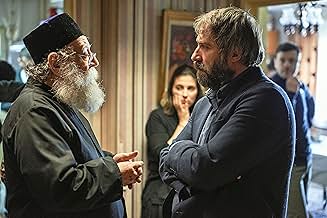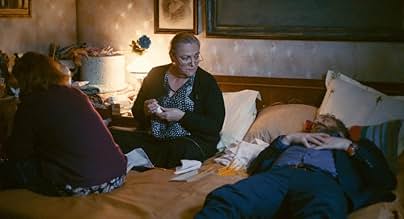IMDb-BEWERTUNG
7,3/10
5962
IHRE BEWERTUNG
Ein nagelneuer Polizist arbeitet mit einem Undercover-Agenten zusammen, um einen finsteren Gangster und seine Crew abzuschalten.Ein nagelneuer Polizist arbeitet mit einem Undercover-Agenten zusammen, um einen finsteren Gangster und seine Crew abzuschalten.Ein nagelneuer Polizist arbeitet mit einem Undercover-Agenten zusammen, um einen finsteren Gangster und seine Crew abzuschalten.
- Auszeichnungen
- 21 Gewinne & 21 Nominierungen insgesamt
Empfohlene Bewertungen
The long demanding exhausting movie is permeated with Eastern European scent. The legacy of the poor relatives and backyards of Europe is recognisable in every excruciating detail for those who had grown up there. Smallish crowded kitchens with dilapidated cabinets. Worn out light switches which were the same in Bucharest or Kyiv. Long tables if unfolded occupy the whole living room and you squeeze yourself out to get to your seat. Low-waged doctors who downshift to medical equipment salesmen. And the family saga which unfolds painfully slow and mesmerisingly absorbing. Once you are on the other side of the film equator you cannot but start guessing what the hell is going on in this family. Cutting of the movie is so unorthodox that you start wondering if there had been any cutting at all.
I love this movie completely! I went to see it in a Friday evening, 9 PM, but it won my full attention from the first line! I have enjoyed every single second of its 3 hours although I was tired and it changed my spirit, made me laugh, made me think, made me happy. It is a movie created from our very essence as a nation, from our each and every archetype, from our collective or individual beliefs, but with a director touch of genius that makes the movie to be an incredible story and an amazing movie experience. It is, for sure a state of mind movie, but, at the same time, I believe it's one movie that builds its own state into your mind. The thing I loved the most about the movie is the dynamics of the characters, each being its own archetype and what happens between them is completely delusional (in its best sense). The choice of the actors - truly inspired, every one fits its character best and it feels like you are really in that apartment with them as the synergy created is so well built. Highly recommend it! Congrats to our talented directors, for such an incredible year for the Romanian movie scene!
There are two things you need to be willing to embrace before you watch this film. First, the film is not going to make the connections between the characters easy for you. If you are a lazy viewer who is not paying close attention to the dialogue or you do not grasp the connections between the various dramas that are played out, you might be frustrated with what superficially appears to be a lack of direction and feel the film is "pointless". Second, the film is EXTREMELY Eastern European in character. If you want a Hollywood ending you will not find it here.
However, I simply love films like this that propel you into a difficult family situation and spend most of the film time there, allowing you to try to figure out for yourself what's going on. "The Godfather" is one example; I was also a huge fan of Roman Polanski's "Carnage". For people who like that kind of thing this film is a huge treat. It is only at the very end, after the slightly odd car monologue by the main character, that you really feel satisfied with what the film has accomplished and that you have come to understand a subtle coherence within the mess of individual failed narratives. Every character in this film is a self-actualized, 21st century individual who has come up with their own personal story about how the world works. The film's plot makes that obvious, but the remaining questions are up to you: where are the lies? Where is the truth? What happens to the main character at the end? This is a rather beautiful puzzle to behold.
However, I simply love films like this that propel you into a difficult family situation and spend most of the film time there, allowing you to try to figure out for yourself what's going on. "The Godfather" is one example; I was also a huge fan of Roman Polanski's "Carnage". For people who like that kind of thing this film is a huge treat. It is only at the very end, after the slightly odd car monologue by the main character, that you really feel satisfied with what the film has accomplished and that you have come to understand a subtle coherence within the mess of individual failed narratives. Every character in this film is a self-actualized, 21st century individual who has come up with their own personal story about how the world works. The film's plot makes that obvious, but the remaining questions are up to you: where are the lies? Where is the truth? What happens to the main character at the end? This is a rather beautiful puzzle to behold.
Wow, wow, wow, did I say wow? Wow!
How can three hours of movie go so fast? the movie in itself is very local, but so human, so for people acquainted with the old ways in the Eastern Europe region, this is very evocative.
Everyone, will find a character to like, and one to despise, one too similar to him, and one so dissimilar, that it hurts. Unfortunately I'm a national, and can't figure if the translations make it right, but for sure the dialogue, looks like a stage of 12 Angry Men (this time more like 15), exposing the back bone of a life time at the Paradise's gates.
Sure there are quite a few good movies on the theme, but not many filmed 90% in 500 square feet. So the feeling of being there is so real.
Unfortunately if the first hour eats your interest, I can understand how other people got bored, where I got so excited. Thought the reality of characters is very crisp, almost to the point I can say - that is uncle A, that's Grandpa', and that's Aunt M.
So if you want to get your head spinning, to feel momentary hate for some characters otherwise benign at other points, and wanting to get real exposure to end-of-Communism Romanian urban life. This is it!
How can three hours of movie go so fast? the movie in itself is very local, but so human, so for people acquainted with the old ways in the Eastern Europe region, this is very evocative.
Everyone, will find a character to like, and one to despise, one too similar to him, and one so dissimilar, that it hurts. Unfortunately I'm a national, and can't figure if the translations make it right, but for sure the dialogue, looks like a stage of 12 Angry Men (this time more like 15), exposing the back bone of a life time at the Paradise's gates.
Sure there are quite a few good movies on the theme, but not many filmed 90% in 500 square feet. So the feeling of being there is so real.
Unfortunately if the first hour eats your interest, I can understand how other people got bored, where I got so excited. Thought the reality of characters is very crisp, almost to the point I can say - that is uncle A, that's Grandpa', and that's Aunt M.
So if you want to get your head spinning, to feel momentary hate for some characters otherwise benign at other points, and wanting to get real exposure to end-of-Communism Romanian urban life. This is it!
Throughout history, the seventh art, with its hundred-year history, has seen many twists and turns, it has been taken from various small cultural and artistic movements until a large number of them carry the history of cinema on their shoulders, various companies and their constant policies, geographical determinism and various wars have subjected this field to it.
One of these factors is the various cultural movements.
Whether they like it or not, movements are always happening throughout the history of art, even in other human lives, sometimes with the speed of lightning and sometimes like the last turbulent sea.
The Romanian New Wave is one of those cultural movements, especially in film, that moves slowly in terms of its connection to the plots and internal atmosphere of its films, but like the last ones, it is angry, roaring and criticizing.
The theme of this wave, which began in the first decade of the 21st century, is to slowly portray social events to us, and it is so realistic that we watch scenes from last night's party with our relatives and relatives, or, for example, a scene of something that happened to a sister or brother, that's how it is and does it. There is a period of cinema in between that includes storytelling in the heart of simple everyday events and invites us to identify with them to such an extent, but perhaps what makes Romanian New Wave cinema special is its closeness to realism and its fearlessness, and it can be more glorious in stories that can be in real cinema.
The plot is probably less popular with cinema audiences because of the very area in which it shows its films, directors whose films are similar to theirs, both in terms of form and content and narrative, can be found in corners of world cinema - all of which are separated from mainstream cinema, with slow, bold plots and what might happen. They bring their script to the film, which truly shapes the entirety of Romanian New Wave films, with these tools and creative texts and subtexts, in the following years, a step towards establishing this medium in terms of the problems of living conditions, political and social conditions, problems of family life and especially and the exploration of human morality.
Romanian New Wave cinema is the movement of the camera on the hand in the hallways and rooms of apartment buildings in order to show everyday events, the cinema is the cinema of showing the chatter and conversation of people around the dinner table, the cinema of rape of the individual and the way he deals with this issue, it is a film that every country can understand because it cannot understand a person at all because it makes a person more.
Minimal space, bright colors and dark nights, scripts full of dialogue and monologues, and the camera being in the flow and instability of events, whose very instability has also created stability for itself.
Siranvada, along with other important works by several directors of this movement, is one of the most seen works of this wave, along with masterpieces such as "4 Months, 3 Weeks and 2 Days" or "Graduation Party", both of which can be attributed to Cristian Mongeau, who was made by Cristian Puio, and both of these directors had an impact on the formation of this movement.
Siranvada falls short of the important works of the Romanian New Wave because, in addition to being an average and correct film, it also has the theme and cinema of the New Wave within it, and with its minimalist atmosphere, it also gives you a special mood, tells the stories of different people and always tells about different arguments and discussions, although you may use different plots. It will captivate the audience.
There are stories of different people who have gathered together on the occasion of the fortieth anniversary of the death of one of their relatives and want to hold a party...
One of these factors is the various cultural movements.
Whether they like it or not, movements are always happening throughout the history of art, even in other human lives, sometimes with the speed of lightning and sometimes like the last turbulent sea.
The Romanian New Wave is one of those cultural movements, especially in film, that moves slowly in terms of its connection to the plots and internal atmosphere of its films, but like the last ones, it is angry, roaring and criticizing.
The theme of this wave, which began in the first decade of the 21st century, is to slowly portray social events to us, and it is so realistic that we watch scenes from last night's party with our relatives and relatives, or, for example, a scene of something that happened to a sister or brother, that's how it is and does it. There is a period of cinema in between that includes storytelling in the heart of simple everyday events and invites us to identify with them to such an extent, but perhaps what makes Romanian New Wave cinema special is its closeness to realism and its fearlessness, and it can be more glorious in stories that can be in real cinema.
The plot is probably less popular with cinema audiences because of the very area in which it shows its films, directors whose films are similar to theirs, both in terms of form and content and narrative, can be found in corners of world cinema - all of which are separated from mainstream cinema, with slow, bold plots and what might happen. They bring their script to the film, which truly shapes the entirety of Romanian New Wave films, with these tools and creative texts and subtexts, in the following years, a step towards establishing this medium in terms of the problems of living conditions, political and social conditions, problems of family life and especially and the exploration of human morality.
Romanian New Wave cinema is the movement of the camera on the hand in the hallways and rooms of apartment buildings in order to show everyday events, the cinema is the cinema of showing the chatter and conversation of people around the dinner table, the cinema of rape of the individual and the way he deals with this issue, it is a film that every country can understand because it cannot understand a person at all because it makes a person more.
Minimal space, bright colors and dark nights, scripts full of dialogue and monologues, and the camera being in the flow and instability of events, whose very instability has also created stability for itself.
Siranvada, along with other important works by several directors of this movement, is one of the most seen works of this wave, along with masterpieces such as "4 Months, 3 Weeks and 2 Days" or "Graduation Party", both of which can be attributed to Cristian Mongeau, who was made by Cristian Puio, and both of these directors had an impact on the formation of this movement.
Siranvada falls short of the important works of the Romanian New Wave because, in addition to being an average and correct film, it also has the theme and cinema of the New Wave within it, and with its minimalist atmosphere, it also gives you a special mood, tells the stories of different people and always tells about different arguments and discussions, although you may use different plots. It will captivate the audience.
There are stories of different people who have gathered together on the occasion of the fortieth anniversary of the death of one of their relatives and want to hold a party...
Wusstest du schon
- WissenswertesThe title, deliberately misspelled, is a parody of esoteric film titles and does not refer to anything specific.
- Crazy CreditsSilvia Nastase is credited in the opening titles but not in the end credits.
- VerbindungenReferences Schneewittchen und die sieben Zwerge (1937)
- SoundtracksSymphony in C minor J-C 9, I. Allegro
Composed by Giovanni Battista Sammartini
Performed by Aradia Ensemble
Conducted by Kevin Mallon
Courtesy of Naxos Deutschland GmbH
Top-Auswahl
Melde dich zum Bewerten an und greife auf die Watchlist für personalisierte Empfehlungen zu.
- How long is Sieranevada?Powered by Alexa
Details
- Erscheinungsdatum
- Herkunftsländer
- Offizieller Standort
- Sprache
- Auch bekannt als
- Sieranevada
- Drehorte
- Strada Ionel Perlea, Bukarest, Rumänien(Opening scene: Lary's street)
- Produktionsfirmen
- Weitere beteiligte Unternehmen bei IMDbPro anzeigen
Box Office
- Budget
- 1.400.000 € (geschätzt)
- Weltweiter Bruttoertrag
- 247.196 $
- Laufzeit2 Stunden 53 Minuten
- Farbe
- Seitenverhältnis
- 1.85 : 1
Zu dieser Seite beitragen
Bearbeitung vorschlagen oder fehlenden Inhalt hinzufügen

Oberste Lücke
By what name was Sieranevada - Die Trauerfeier (2016) officially released in India in English?
Antwort






















